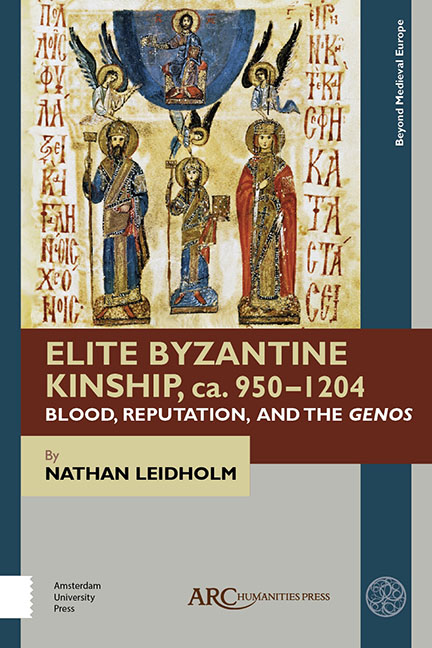Book contents
- Fronrtmatter
- Contents
- List of Abbreviations
- Abbreviation
- Acknowledgements
- Introduction
- Chapter 1 Defining “the Family” in Byzantine Sources and the Modern Historiography
- Chapter 2 The Language of Kinship
- Chapter 3 Marriage Impediments and the Concept of Family
- Chapter 4 Interrogating Consanguinity in a Byzantine Context
- Chapter 5 Family Names and the Politics of Reputation
- Chapter 6 Kinship and Political Developments of the Eleventh and Twelfth Centuries
- Conclusion
- Select Bibliography
- Index
Chapter 4 - Interrogating Consanguinity in a Byzantine Context
Published online by Cambridge University Press: 20 November 2020
- Fronrtmatter
- Contents
- List of Abbreviations
- Abbreviation
- Acknowledgements
- Introduction
- Chapter 1 Defining “the Family” in Byzantine Sources and the Modern Historiography
- Chapter 2 The Language of Kinship
- Chapter 3 Marriage Impediments and the Concept of Family
- Chapter 4 Interrogating Consanguinity in a Byzantine Context
- Chapter 5 Family Names and the Politics of Reputation
- Chapter 6 Kinship and Political Developments of the Eleventh and Twelfth Centuries
- Conclusion
- Select Bibliography
- Index
Summary
… ἐκ θηƛϵίας τινός … οἱ τούτου [Constantine X] κατήγοντο πρόγονοι, ὅθϵν οὐδὲ Δούκας ƛϵƛόγιστο καθαρός, ἀƛƛ’ἐπίμικτος καὶ κϵκιβδηƛϵυμένην ἔχων τὴν πρὸς τοὺς Δούκας συγγένϵιαν.
The ancestors of [Constantine X] descended from some female, whence he was not considered a pure Doukas, but as having mixed and adulterated kinship with the Doukai.
John Zonaras, Epitome Historiarum, 18.8.12– 14JOHN ZONARAS, THE twelfth-century theologian and author of a history of the world, delivers an aside in his Epitome of Histories regarding the family and ancestry of Emperor Constantine X Doukas (r. 1059– 1067). In it, Zonaras questions the legitimacy of Constantine's claim to membership in the genos of the Doukai. The sentiment is an odd one on its own, as no other surviving source seems to share Zonaras's view of the emperor's descent, but it is made even more so by the reasons Zonaras gives for his critique. He tells his readers that all the male members of the Doukas family were wiped out following the failed revolt of Andronikos and Constantine Doukas in 913. Constantine X was thus related to the tenth-century family through the female line, which is apparently enough to have polluted his bloodline, or at least to have diluted his legitimate claim to membership in the genos of Doukas. Though Zonaras's opposition to Alexios I Komnenos, who was married to a member of the Doukas family, is well-documented, and probably helps explain his apparent issues with Constantine X, the method chosen to discredit him appears unusual in a Byzantine context.
Strictly agnatic lines of descent were never a part of Byzantine culture. The classical Roman familia, consisting of a male paterfamilias who held absolute authority over all of his living descendants through the male line, had effectively disappeared long before the tenth century in Byzantium. Byzantine law always favoured equitable, partible inheritance practices, including for one's daughters. Family names could be inherited through the female line as often as through the male. At first glance, it appears that Zonaras's comments bear witness to a current within Byzantine thought not generally acknowledged to have existed at all, and one that could have serious implications for how modern scholars understand the intergenerational reproduction of families in a Byzantine context.
- Type
- Chapter
- Information
- Elite Byzantine Kinship, ca. 950–1204Blood, Reputation, and the Genos, pp. 87 - 110Publisher: Amsterdam University PressPrint publication year: 2019

